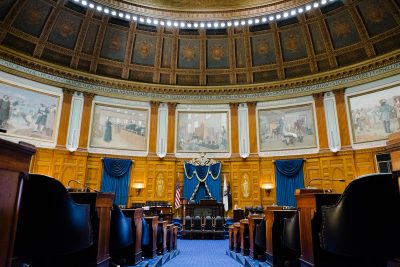
Massachusetts Senate and House of Representative members on the Joint Committee on Marijuana Policy are locked in disagreement over recreational marijuana legislation, both having proposed conflicting bills amending Ballot Question 4, which passed in November.
While members from both sides agree that amendments should be made in the language of the initial ballot question, the amending bill passed by the House on Wednesday night outlines far more expansive and controversial changes than that proposed by the Senate, according to The Boston Globe.
Two of the most contested aspects of the House bill are its increased taxation rate of marijuana products from the ballot’s original maximum of 12 percent to a mandatory 28 percent, and transferring the power to ban cannabis products and farms from local citizens to municipal officials.
Michael Finn, a House member of the Joint Committee on Marijuana Policy, wrote in an email to The Daily Free Press that while he believes the 28 percent tax is too high, he does support a tax increase and the heightened regulations that come with it.
“I did support the bill proposed because I feel that it implements sound regulation of this new industry,” Finn said. “Changes to the ballot proposal are necessary because, in my opinion, their proposed 12 percent tax was not high enough to properly fund the CCC [Cannabis Control Commission] and [the] enforcement of new regulations of this industry.”
The Senate proposal, finalized Thursday after over 10 hours of debate, leaves much of the original ballot question intact, including its 12 percent tax rate and local control provisions, the two aspects that are the most controversial of the House legislation, according to the Globe.
Though the disparity between the Senate and the House’s verdicts on taxation and local control provisions are key differences, the two bodies do agree on various other aspects of marijuana legislation. Both would maintain the 21-year age requirement for limited marijuana use, and strip state Treasurer Deborah Goldberg of her unilateral power over the cannabis industry, according to the Globe.
Despite these similarities, the Senate version of the legislation is the favorite among recreational marijuana advocates.
Jim Borghesani, the spokesperson for Yes on 4 — the organization that spearheaded the campaign for marijuana legalization in November — said he believes the 28 percent tax set in the bill is “irrational” and that the bill itself is “hostile” towards marijuana legality.
“The House bill is terrible,” Borghesani said. “It’s poorly conceived, it’s poorly written and it’s a very ineffective strategy for regulating an effective marijuana market in Massachusetts.”
Borghesani said ideally he would like to have seen the initial legislation set out in the ballot question enacted into law without any changes at all.
“We do not think that the initiative needs any improvements whatsoever,” Borghesani said. “It will work exactly as passed by voters, it is working in other states that have the same system, so the narrative that has come out of the State House that we have to improve this is absolutely false.”
However, in the current situation with the House and Senate at odds, Borghesani said he would like to see the House defer to the Senate on this issue.
“The Senate side is taking a much more reasonable process,” Borghesani said. “They’re allowing the public and other senators to see their legislation, to take a look at it, to give input, they’re not rushing it through and they’re not writing it in secret like the House did. They seem to be taking a transparent approach, a much more thoughtful and intelligent approach then the House did.”
According to the Globe, an unnamed conference committee will now have to reconcile the two versions of this legislation. Time-pressured, the committee only has a week to deliberate the final version of the bill and get it to Governor Charlie Baker’s desk before the June 30 deadline. If the deadline is not met, there may be a risk of further delays to the opening of retail marijuana stores past the current date set in July of 2018.





Till:
Media coverage of this issue has been extremely easy on the legislators. No mention has been made of the major change coming from this legislation for non-medical cannabis. Both the Senate and the House are using this as an opportunity to undo the will of the voters 2012 ballot initiative which is now been Massachusetts state law since 2013. They are handing over medical cannabis from the Department of Public Health to a non-medically directed board that is filled with political appointees and is more concerned with generating revenue and creating a bureaucracy than patient care. The DPH has been doing a pretty good job over the last two years with the medical marijuana program – I believe they have over two to $3 million worth of fees that have been collected and would be transferred to this new medical marijuana commission. So fees that have been generated of debilitated patients with illnesses such as cancer, AIDS, multiple sclerosis, chronic pain, Crohn’s disease and others will be used so everybody can smoke a joint and get high instead of directed to enriching the medical cannabis program.
I would urge every citizen To contact their legislator and demand the following:
1. Medical Cannabis stays with the DPH.
2. No changes in the Taxing Of Medical Cannabis including sales tax.
3. No changes in who provides services to patients unless it comes directly from the DPH.
4. Our State Treasurer, Deborah B. Goldberg, remains in control of the process. She is a capable proven leader and totally appropriate for the regulation of non-medical cannabis. It is doubtful you would have attempted this power play if she were a man.